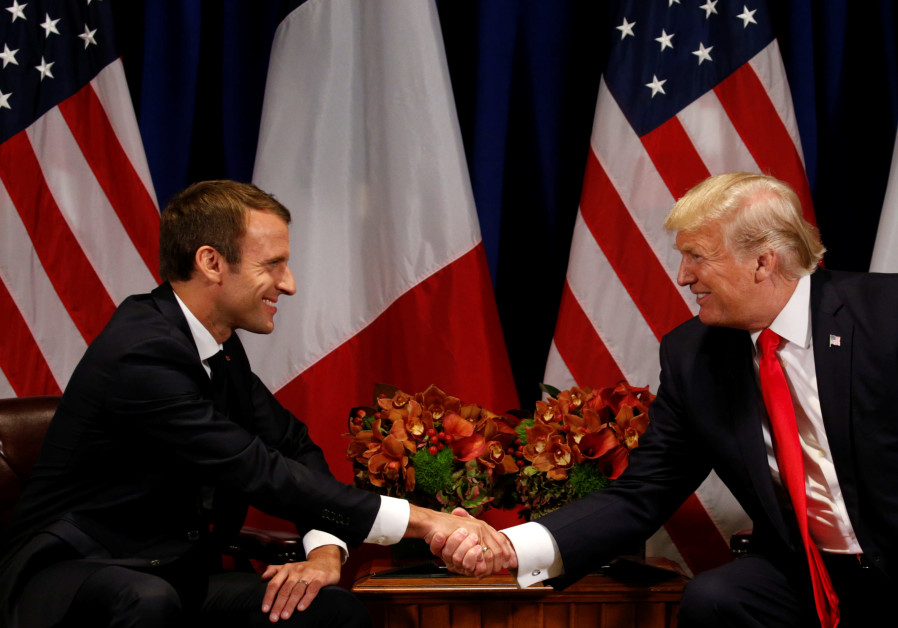What the new French-American tag team means for the Middle East

US President Donald Trump meets French President Emmanuel Macron in New York, US, September 18, 2017.. (photo credit: REUTERS/KEVIN LAMARQUE)
During meetings in Washington, French President Emmanuel Macron and his US counterpart, Donald Trump, appeared to frolic in pleasantries.
Macron smiled, shook hands and patted Trump on the back. They planted an oak tree together at the White House. The tree was from Belleau Wood, where the US Marines had fought alongside French Poilus, infantry soldiers, to repel the German army in June 1918. Today Franco-American relations appear at one of their highest points since the time of Jefferson and Lafayette and France joined the US and UK for air strikes on Syria and has sought to stand alongside US policy in eastern Syria.
The larger story of the Macron-Trump meetings in Washington is part of a clear bond formed between the pair. The relationship had an awkward start in May 2017 at the Nato summit in Brussels when they had a “handshake battle,” each trying to grip the others’ hand harder. At the time they were at odds over climate change issues. They also met in July when Trump was a guest of honor at Bastille Day events marking the 100th anniversary of the entry of the US into the First World War. It was unclear what the 39-year-old political maverick in Paris saw in Trump, although the two were both political outsiders with a business background.
In Washington this week, Macron said that the US and France have “an appointment with history,” and it seems clear that the French president wants to remind America about the past glory and sacrifices of the Great War.
France24 noted that “Macron, who calls Trump often, has emerged as something of a ‘Trump whisperer’ at a time when the American president’s relationships with other European leaders are more strained.” Macron was honored with the first state visit of Trump’s presidency.
The main result of the new Franco-American relationship will be felt in the Middle East. Trump has been talking about withdrawing from eastern Syria and seeking to find other countries that would fund, and support what remains of the US footprint.
France is one of the main countries to step forward in this respect. Macron has also voiced support this week for a “new accord” related to the Iran Deal. Trump has been a harsh critic of the deal and his new National Security Advisor John Bolton and Mike Pompeo, who has been nominated for secretary of state, are also critics of Iran.
Macron has suggested that Washington and Paris work to contain Iran in the region and curtail its ballistic missile program. Ballistic missiles have been fired by Iran’s Houthi allies in Yamen at Saudi Arabia and Iran’s missiles also threaten Israel and other US allies. Trump wants any new deal to cover Iran’s nefarious influence in Syria, Yemen and the region. Macron also spoke about a “new framework” in the region and has said that the US and French role in eastern Syria can be used to achieve some sort of peace.
The main role of Paris is steadying the often rudderless US foreign policy in the Middle East under Trump. It’s a policy that has zigzagged and paid lip service to confronting Iran while also seeking to draw down American commitments. How do you confront Iran when you’re also seeking isolationism?
Macron’s “nous avons un rendezvous avec l’histoire,” the “appointment with history” is full of strong and emotional commitments to what he calls a “duty.” Macron went to the grave of John F. Kennedy and the Tomb of the Unknown Soldier.
In channeling JFK, the French president likely recalled that the youthful US president had gone to Paris in 1961 where he met Charles de Gaulle at the Quai d’Orsay and Elysee Palace. JFK said the US would stay committed to Europe and American forces would remain.
They also spoke about French and US cooperation in Southeast Asia and Africa. It’s clear that today, Macron seeks a similar commitment by the US and France in the Middle East and that he sees France as playing a transformative role.
For Israel, this is welcome news because it means that two of the world’s great powers appear to understand the Iranian threat the way Jerusalem has been warning for years. Now the question is what concrete steps will actually be taken in Syria and other places.





Comments are closed.